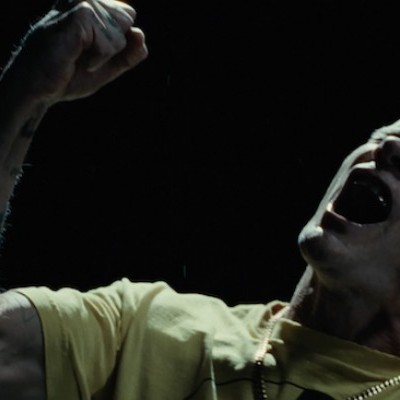Dec 9, 2025 12:28 PM
In Memoriam: Gordon Goodwin, 1954–2025
Gordon Goodwin, an award-winning saxophonist, pianist, bandleader, composer and arranger, died Dec. 8 in Los Angeles.…

Alto saxophonist Immanuel Wilkins’ debut album is titled Omega.
(Photo: Dana Scruggs)Immanuel Wilkins’ debut album, Omega (Blue Note), marks the emergence of a talented young instrumentalist, composer and bandleader with an instantly identifiable voice. It also makes a dramatic statement about issues associated with Black life in 20th- and 21st-century America. Recorded in January 2019 and produced by Jason Moran, Omega features the 23-year-old alto saxophonist’s working quartet with pianist Micah Thomas, bassist Daryl Johns and drummer Kweku Sumbry, a group dedicated to Wilkins’ vision of developing emotionally charged original music that speaks directly to the Black experience.
Take, for example, the album’s second track, “Ferguson–An American Tradition,” which conveys the intense emotions Wilkins felt as a teenager following the 2014 killing of Michael Brown Jr. by police in Ferguson, Missouri. “Growing up, my parents were always adamant in reminding me of my color, reminding me of the social situation that was going on in the world, so I always had an acute awareness,” he said during a phone call from his hometown of Philadelphia. “But Ferguson hit me specifically because Michael Brown and I were close in age. And I realized that it could happen to anybody.”
The piece deals with events in a reverse narrative, starting with the aftermath of Brown’s killing, then working its way back to the initial experience. It’s an intense ride. “A lot of what we were trying to capture was an idea of cacophony, of chaos,” said Wilkins, who noted that the 7-minute track also plays to his personal fascination with the meeting of jarring and wondrous imagery in art and culture. “I’ve been obsessed with social media, TikTok, Twitter, Black Twitter, Black TikTok, and how there’s always this kind of sublime, grotesque juxtaposition in ways that are beautiful, in ways that are hilarious, in ways that are nostalgic. I’m obsessed with those type of aesthetics.”
A companion piece titled “Mary Turner–An American Tradition” tells the shockingly tragic but seldom-told story of a 1918 lynching that took place in Georgia. “I had done some research after learning about the Michael Brown situation on the history of America in terms of killing Black people,” Wilkins said. “And the story of Mary Turner was one of the more horrific things that I had found. When I was writing that piece I was thinking about, how do you paint a picture of that terror she must have felt?”
Omega also celebrates the Black experience in solemn and jubilant ways. The uplifting leadoff track, “Warriors,” exalts family, friendship, faith and community. “The Dreamer” delivers a tranquil reflection on influential Black activist and author Weldon Johnson. And a four-part suite of pieces informed by Wilkins’ experience as a church musician and student of Bach celebrates the long arc of a romantic love affair.
Since moving to New York in 2015 to attend Juilliard, Wilkins has earned a sterling reputation as a versatile sideman who’s capable of just about everything. He’s worked for high-profile leaders like Moran, Wynton Marsalis, Aaron Parks and Solange Knowles, to name a few.
“I always had this mentality of, ‘Why not do it all?’” Wilkins said. “My musical mission is to blend traditions. It’s not about removing things from the music; it’s more like stacking things on top of each other. If you’re stacking cardboard boxes, once you get to a certain number of boxes, they start to crush each other. And that’s not what we want to do in the music. It’s not about forsaking things. The real trick, and what makes playing this music so hard, is that we’ve got to make sure these boxes stay intact. So, it’s actually about building on the tradition.” DB
This story originally was published in the December 2020 issue of DownBeat. Subscribe here.

Goodwin was one of the most acclaimed, successful and influential jazz musicians of his generation.
Dec 9, 2025 12:28 PM
Gordon Goodwin, an award-winning saxophonist, pianist, bandleader, composer and arranger, died Dec. 8 in Los Angeles.…

Belá Fleck during an interview with Fredrika Whitfield on CNN.
Jan 13, 2026 2:09 PM
The fallout from the renaming of the John F. Kennedy Center for the Performing Arts to include President Donald…

The success of Oregon’s first album, 1971’s Music Of Another Present Era, allowed Towner to establish a solo career.
Jan 19, 2026 5:02 PM
Ralph Towner, a guitarist and composer who blended multiple genres, including jazz — and throughout them all remained…

Flea has returned to his first instrument — the trumpet — and assembled a dream band of jazz musicians to record a new album.
Dec 2, 2025 2:01 AM
After a nearly five-decade career as one of his generation’s defining rock bassists, Flea has returned to his first…

Rico’s Anti-Microbial Instrument Swab
Jan 19, 2026 2:48 PM
With this year’s NAMM Show right around the corner, we can look forward to plenty of new and innovative instruments…